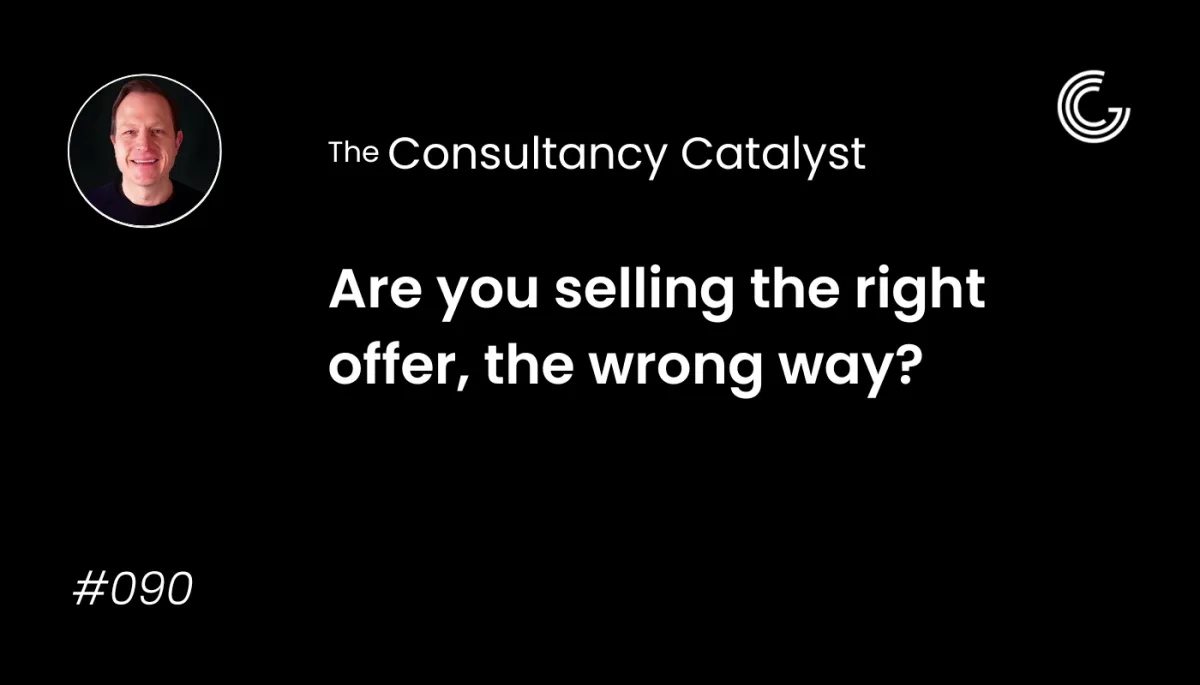The Consultancy Catalyst
Practical tips to build a more valuable, impactful and fulfilling consultancy.
Every Friday morning, you'll get 1 actionable tip to make your consultancy more valuable, impactful and fulfilling in less than 4 minutes.

Are you selling the right offer, the wrong way?
Have you ever lost a deal you know you should have won? When you lose a consultancy sale where you were the best match for the job, it probably isn’t because your offer was wrong, but because your sales process didn’t match how your clients actually wanted to buy.
Two mistakes that kill consultancy sales are:
Trying to close strategic projects with impulse tactics. Or killing impulse momentum with strategic overthinking.
Here's how to fix it.
The two sales journeys
Every consultancy offer belongs in one of two buying journeys, and it often depends on whether you are selling to a single decision maker or a decision-making unit:
The Impulse Journey
Fast, emotional, single-decision-maker.
Your buyer is typically a founder, solo leader or department head who can say yes to what you’re selling in one conversation. They're buying on gut, credibility, and clarity - not 20-page proposals.
Examples: workshops, diagnostics, entry offers, quick-win projects
What they need from you:
A clear, confident offer that’s within their budget range
Proof you understand their world
A simple way to say yes now
They decide fast, but they also move on fast. Your window is narrow.
The Strategic Journey
Slow, logical, multi-stakeholder.
Your buyer needs to build consensus across a decision-making unit (finance, ops, leadership). They're not reacting to a spark - they're building a business case.
Examples: retainers, transformation projects, strategic partnerships
What they need from you:
Depth and demonstrated expertise
Proof, case studies, and credibility markers
Multiple touchpoints to build trust over time
They move slowly, but when they commit, they commit deeply.
The problem of mismatched systems
Many solo and boutique consultancies that rely on founder-led sales try to sell strategic offers through impulse systems, because that’s the way they buy.
And most people selling to them sell impulse-based sales techniques, because it works for who they are selling to. The trouble is you’re not selling to other people like you. You’re selling to a decision-making unit, or you’re selling to someone who will need to justify their decision to others.
Trying what worked on you, like quick calls and fast closes, will leave you wondering why prospects ghost after you after the early conversations.
If you are selling to people who can and want to make a quick decision, you might overcomplicate impulse offers with a drawn-out sales process that kills the energy.
When your sales process doesn't match your buyer's journey, you either exhaust yourself or confuse the prospect.
How to align their journey with yours
Step 1: Identify your foundation offer
This is the first thing a client needs to buy from you - the entry point to your world.
Ask yourself: "Could my ideal client buy this in a single conversation, or do they need to convince others first?”
Then, sense check your answer:
If it's under £5k and solves an urgent, visible problem → Impulse.
If it's over £10k and requires internal buy-in → Strategic.
Also, remember the price point isn’t always the differentiator. You might be selling something at £5k to a single decision maker, which is a significant strategic shift for them. If so, it’ll be a much more considered purchase for the buyer and will therefore better fit the strategic rather than impulse sale.
Step 2: Map the decision points
Every sales journey has critical moments where buyers either move forward or stall.
For Impulse buyers:
Decision point = "Do I trust this person/solution can solve my problem now?"
They need: immediate clarity, emotional resonance, and a frictionless yes
For Strategic buyers:
Decision points = "Can I build a case for this?" & "Will my stakeholders agree?"
They need: proof points, risk mitigation, and multiple trust-building touchpoints
Your job is to design your sales process around their decision points, not yours.
Step 3: Build the right sales journey
Match your assets and touchpoints to how your customers want to buy:
Don't fight how your clients want to buy. Build the system around how your best clients naturally make decisions.
The mistake consultants make when they haven’t understood their client’s buying journey:
They use Strategic tactics (long proposals, multiple meetings, "let me send you more info") for Impulse buyers - killing momentum. Or they use Impulse tactics (pitch on first call, push for fast close) for Strategic buyers - breaking trust.
When you align your sales process with your buyer's journey, your close rate can double - not because you changed the offer, but because you stopped selling it the wrong way.
Want the step-by-step system?
My Ready-To-Buy Playbook shows exactly how to build predictable client acquisition for solo and boutique consultancy owners - including how to handle complex buying committees without losing momentum.
Subscribe to the Newsletter
Join fellow specialist consultancy owners reading The Consultancy Catalyst every Friday for exclusive tips, strategies and resources to make your consultancy move valuable, impactful and fulfilling.
Testimonials

We are so grateful for the amazing photos that [photographer's name] took of our wedding day.
Jane Doe



